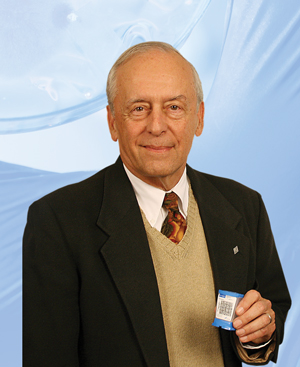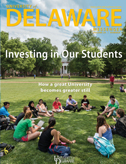Doing well by doing good

ALUMNI & FRIENDS | On Tom Gutshall’s LinkedIn profile, his business (Cepheid Inc.) and nonprofit (CityTeam Ministries) appear side by side as his current affiliations.
The juxtaposition of a commercial enterprise and a charitable one exemplifies the life of this entrepreneur, chemical engineering alum and UD benefactor, who has given generously of his time and treasure.
Gutshall, EG60, has dedicated the latter part of his career to what he calls “doing good by doing well.” Cepheid, the Sunnyvale, California–based molecular diagnostics company he started in 1996 with inventor Kurt Petersen, offers rapid tests for healthcare-associated infections, critical infectious diseases, sexual health, virology, oncology and genetics.
By partnering with groups like the World Health Organization, the company has successfully implemented its technology, known as GeneXpert™, across the globe and linked medical necessity with diagnostic resource.
“There’s a wealth of information swirling around, and technology has enabled us to capture it, organize it, and get it to people who can use it,” Gutshall says.
“We can diagnose a patient with a rare disease in Cape Town, South Africa, and connect that person with a specialist in London who can make recommendations for care. And we can provide data on the rates of HIV in Guinea to an epidemiologist in Switzerland.”
Gutshall emphasizes that this technology is not just for the upper 5 percent of people in the United States and Canada. It’s for anyone facing a healthcare crisis, from Ebola outbreaks in Sierra Leone, to human papillomavirus infections in Malaysia.
“Wherever you are, whoever you are, we can help by detecting or monitoring disease, which permits you to receive the care you need,” he says. “Our goal is to improve quality of life, coupling tools like cell phones and the cloud to move diagnostics data to where it’s needed.”
Gutshall’s years as head of Cepheid confirmed his belief that “you can charge reasonable prices for drugs and medical devices and still be successful.” Annual revenue for the company, which went public in 2000, is now over $500 million.
Gutshall stepped down as chairman in 2012, but he was not finished with bringing innovative medical technology to those who need it most.
Since 2013, he has been an investor and board member of Profusa, a diagnostics company focused on enabling continuous biofeedback for chronic disease management and healthy living. For instance, one of its new products, the Lumee, continuously tracks the most critical elements of a person’s body chemistry and then transmits that data directly to his or her physician for diagnosis. Lumee is already being hailed as a ground-breaking tool for long-term management of chronic diseases such as peripheral artery disease, diabetes and chronic obstructive pulmonary disease.
“This is a great example of how engineers can really change the world,” says Babatunde A. Ogunnaike, dean of UD’s College of Engineering. “It shows how we have the potential to create the future—make the future happen—rather than just passively predicting it.”
For his part, Gutshall continues to help invent tomorrow for millions around the world, and for many more closer to home.
Having studied under some of the most world-renowned professors in chemical engineering—the ones who literally wrote the book on the subject—he and his wife established the Thomas and Kipp Gutshall Career Development Chair in Chemical Engineering in 2011. “My professors helped make me who I am today,” he says. “Establishing this chair was my way to pay that forward.”
Article by Diane Kukich, AS73, 84M



